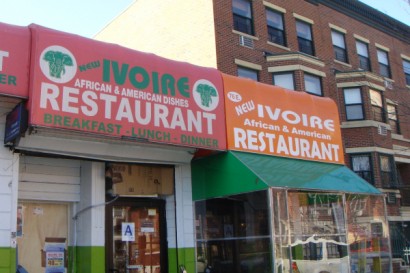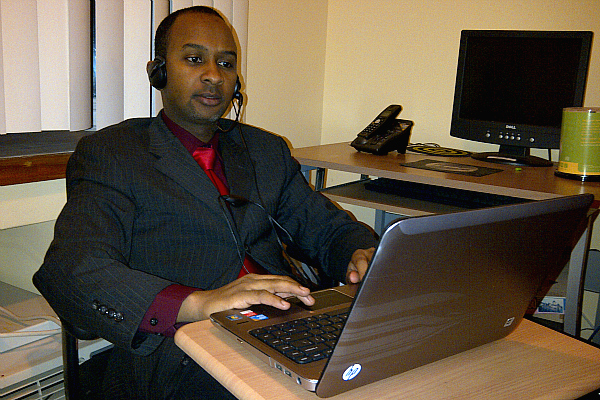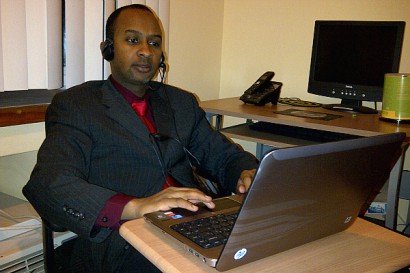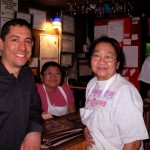Reporter Abdulai Bah originally produced this radio story for our partner WNYC Radio. It aired on Sunday, March 25, 2012.
Twice a week, Souleymane Diallo, a 28-year-old immigrant from Guinea, broadcasts his own evening talk radio show from his Brooklyn apartment.
He has no studio, no recording equipment and no transmitter. But Diallo has a telephone line, a computer and the desire to inform and engage his fellow immigrants of New York City on everything from politics to diet.
Diallo is one of the hundreds of West African immigrants in the U.S. who use free conference-call services — like those used in office business meetings — to host free radio shows that can be dialed into from anywhere in the country.
Listen to the story:
There are more than a dozen conference-call radio stations across the U.S., mostly run by Guineans and a few other immigrants from French speaking African countries. Each station has an average of seven or more different shows that are hosted by different people.
“We want to help our fellow immigrants integrate the American society, respect the law of the land, pay taxes, fix their immigration status, help each other, and connect with each other,” Diallo said.
Diallo said his audience is between 1,000 and 3,000 listeners when he broadcasts from 9 p.m. to about midnight Tuesdays and Fridays.
Earlier this month, Diallo had executive director of Harlem Tenants Council, Nellie Hester Baily, on as a guest. For nearly an hour, Baily spoke about tenants rights, ways to file complaints and get repairs done, and she offered advice on rent subsidies.
With a web-based interface that comes with a free conference-call account, Diallo says he can see all the calls on the line from his computer screen, and he can mute or un-mute any of the calls and can take questions or comments from listeners.
A few years ago, Diallo and his fellow Guineans stumbled upon on the free conference-call technology used to hold meetings or host other work-related activities.
“We said, ‘Hold on a minute,’” he said. “’We could ask people to call this phone line to listen to a discussion or something like that.’”
Following the 2008 death of Guinea’s president, Lansana Conté, who had ruled the mineral-rich West African country with an iron fist for 24 years, Diallo felt a need to start a call-in show.
“There was a need for us to do something to keep the people informed,” he added.

Many Ivorian cab drivers come to Ivoire Restaurant to discuss issues debated on conference-call radio shows. (Photo: Abdulai Bah for WNYC)
Diallo also said the online tool of the conference call account enables him to record and store audio on a separate website for people to listen and share.
Diallo is a former Chase Bank financial advisor and member of “Pottal Fii Bhantal” or Together for Development in Fulani (one of the many dialects spoken in Guinea). He does not have a journalism background.
“I think of myself as a community organizer,” said Diallo who is currently unemployed, and is pursuing a Masters’ Degree at Keller Graduate School of Management.
There are many listeners of conference-call radio in New York City. One of them is Omar, 35, who asked not to use his last name. He said he listens to a variety of free conference-call radio shows while cruising around the city in his cab.
“They keep me informed about what’s going on in America and back home,” said the Ivorian immigrant in French, as he weaved through city traffic. “I like to listen to African radio stations when passengers are not talking to me.”
Omar said he prefers listening to Jacques Roger, a popular Ivorian journalist based in Washington D.C., who broadcasts in French using the conference call technology, and focuses mostly on francophone African countries.
Prior to using the conference call technology for broadcast, Diallo says he and his friends used to buy air time on city-based radio station once a week to broadcast to fellow Guineans.
They used to pay $600 for two hours, and broadcast from midnight to 2am.
But it was difficult to get the money to buy air time every week, he acknowledged. Now, with the conference-call technology, “we don’t worry about paying money anymore to keep our people informed.”
Some conference call radio shows you can tune into:
Read Feet in 2 Worlds reporter Mohsin Zaheer’s New York Post story about what New York cab drivers are talking about and listening to as they roam the city’s streets.
Feet in 2 Worlds is a project of the Center for New York City Affairs at The New School, supported by the New York Community Trust and the John S. and James L. Knight Foundation with additional support from the Mertz Gilmore Foundation and the Ralph E. Ogden Foundation.





